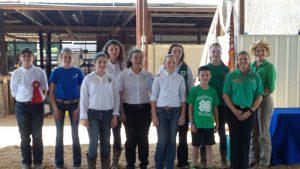by Melanie Taylor | Apr 24, 2017
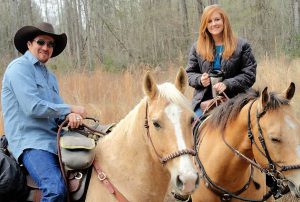
Russell and Julie McMillian, Gulf County 4-H Alumnae and 4-H Leaders
Russell and Julie McMillian both grew up in Gulf County and together have established a thriving business based on their love of horses. They now own a small farm in Dalkeith, just south of Wewahitchka, and their business Rockin’ M Ranch, consists of horseback riding lessons for beginners and beach rides for tourists and locals alike along the beautiful beaches of Cape San Blas.
How did this all begin? Russell and Julie both grew up as Gulf County 4-H members of the Big River Riders 4-H Club. They both participated in a variety of 4-H programs; including Horse Camp, Camp Timpoochee, Congress (now known as 4-H University), District Events, North Florida Fair Ag Judging, Area A and State 4-H Horse Shows, etc. They both learned the values of 4-H through learning how to raise and compete with their animals, agricultural commodities, leadership skills, public speaking, community service, good decision making skills, and much more…
As adults, they both went in separate directions, but still maintained their love of horses and the farm life. Russell began his career in flooring and tile work, while Julie received her education degree and taught Kindergarten at Wewahitchka Elementary School. After reconnecting as adults, they married on September 25, 2010 and turned their passion for horses into a full-time love by creating their own business, Rockin’ M Ranch. Russell still does flooring, tile work on the side, and helps his grandparents with their hay business. Julie decided to leave the teaching field, and she manages their business full time. She began giving beach rides on the Cape at the age of 14 and still loves it as much today.
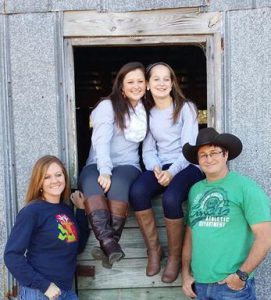
Julie and Russell McMillian pictured with Brooke (left) and Hayleigh (right).
Russell began his time with 4-H at the age of 12 and Julie was 8 years old. As members of the Big River Riders 4-H Club, they adored their 4-H leaders, Mr. Jesse Eubanks and Ms. Jean McMillian (Russell’s grandmother), and the Gulf County Extension Director, Roy L. Carter (now retired), whose passion for horses was contagious. Julie explained that she was a very shy child and that participating in public speaking for District Events really helped her come out of her shell. They both loved learning the values of the four H’s: Head, Heart, Hands, and Health. They feel 4-H has helped them develop into productive adults with good decision-making skills and in-stilled in them the importance of giving back to their community. They have served as 4-H volunteers for the Big River Rider’s 4-H Club since Russell’s daughters joined 4-H years ago; Brooke (17) and Hayleigh (15) also ride horses and have competed in a variety of Gulf County 4-H programs throughout the years. Russell and Julie have also taught a variety of horse riding classes at multiple Gulf County 4-H day camps.
As 4-H and community leaders, their most important goal is to give back to the community that gave to them as 4-Hers growing up here. They really love introducing new riders to the love of horses and 4-H. On any day, Russell and Julie can be found throughout the county at various events supporting 4-H members and any youth for that matter.
When asked what advice she has for someone thinking about becoming a 4-H volunteer she said, “Do not have regrets…just do it. Do not be scared off by the fingerprinting and application process. It is quick and easy, and maintains the safety for you and the children. Get started! 4-H is a great opportunity for youth and adults.”
“As a 4-H extension agent, you can only hope to find 4-H volunteers as dedicated as Russell and Julie McMillian. Their passion and love of 4-H is infectious and draws in youth looking for a place to belong.” -Melanie Taylor, Gulf County 4-H Agent
For more information about Rockin’ M Ranch, please go to http://www.therockinmranch.com/. For more information about how to become involved in 4-H, either as a youth member or adult volunteer, visit florida4h.org or contact your local UF IFAS County Extension Office. 4-H offers a variety of roles for volunteers to share their passions, skills and interests.
by Monica Brinkley | Apr 14, 2017
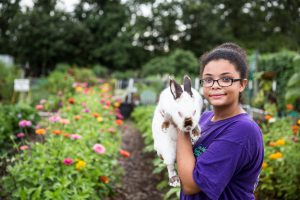
Rabbits are a popular small animal project- but is it a good fit for your family?
With spring in the air, you may be interested in getting a real live bunny. There are a few things to consider before bringing a bunny into your family:
- First consider what purpose you have for the rabbit. Do you want a pet, a rabbit to show, a rabbit to breed, or one for meat? Depending on how you answer the question will depend on what breed you choose. There are many options. The American Rabbit Breeders Association recognizes around 47 different breeds.
- Rabbits come in various sizes, shapes, fur types, and colors. Rabbit range from 2 to 20 pounds. There are several fur types to consider with normal fur being most common to unique fur that require special consideration. Satin fur is known for its luster and sheen. Angora fur is distinctive because of its length and its woolen consistency. Rex fur is a dense fur type, noted for its velvet softness and thickness.
- There are five shapes of rabbits: commercial, compact, full arch, semi-arch, and cylindrical. The most common is the commercial shape. This type is found most often in meat rabbits. The compact is similar to the commercial but has a shorter, more compact body. A rabbit that has a full arch shape is taller than they are wide and have longer limbs. Semi-arch breeds are not as common, are pear-shaped. The cylindrical shape is only found in only one bread, are long and slender.
- Rabbits have an array of color. Some breeds are only recognized in one color and other breeds are recognized in multiple colors. It would be helpful for you to spend time reading about the different breeds as well as spending time with breeders or others who have rabbits. Make sure you look for healthy and lively rabbits who have glossy coats, clear, bright eyes, and clean teeth and ears.
- Rabbits are fun to keep buy need lots of care and daily exercise. They need a roomy cage to in live. Do not use a cage with a wire bottom as the wire hurts their paws. Cages should be washed out once a week with warm, soapy water and rinsed with clean water. Rabbits are like us, they don’t like living in dirty cages. Remove wet bedding and droppings every day. Keep unscented wood shavings in the bottom of the cage. They should have fresh water and hay available at all time. Food should be put in heavy bowls so that they cannot tip them over and fed two small meals a day. Wash their water bottle and food bowls every day.
- Rabbits can be a lot of fun as they are friendly and love to be stroked. You must be a good pet owner and learn to look after your rabbits properly, they may live for up to 10 -12 years. Caring for a rabbit will help you learn how to be responsible for a living animal and how to treat animals properly.
Check with your local 4-H office to see if there is a rabbit club for you to join. You may choose to join the club to become more knowledgeable about rabbits before you become an owner. You then would be able to make informed decision about the perfect breed for you and your family. If you have a passion for rabbits, consider becoming a 4-H rabbit project leader to inspire the next generation of rabbit owners and breeders. Contact your local UF IFAS County Extension Office or visit florida4h.org for more information.
4-H Rabbit Project Page
Online 4-H Rabbit Project Book
North Florida Fair Rabbit Show
by jgl1 | Mar 3, 2017
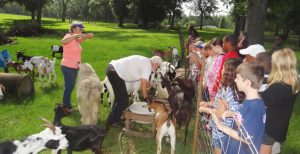
Fred and Bobby teaching a group of 4-Hers about goats.
Fred and Bobbie Golden relocated to Jefferson County from Lakeland, Florida in 2000 to establish Golden Acres Ranch LLC. The sixty-three-acre ranch is home to one of the largest mayhaw ponds in the region, grass fed goat & sheep, free-range chickens, guineas, pet boarding, and a country store.
Bobbie and Fred have genuine love for Jefferson County 4-Hers. Can you tell the difference between a sheep and a goat? Jefferson County 4-H campers can! For the past six years, 5-8 year old youth visited their ranch during 4-H day camps for some hands-on learning about agriculture. The campers have opportunities to feed, pet and learn important facts about Tennessee Fainting Goats, sheep, Pyrenees and Maremma, chicken, guineas and other animals reared on the farm.
Abagail Loveless, day camp participant said, “the reasons I like to visit Golden Acers Ranch, you get to feed, pet, learn things about the farm animals and swing on the tire/rope. “London Skipworth indicated that she was afraid of chickens, but with help and support from teen counselors and 4-H Staff, she was able to overcome her fears. London now plans to participate in the 4-H Chick Chain Project this year.
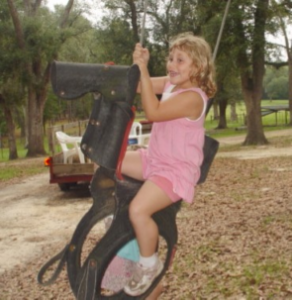
After a day of farming, Abigail enjoys a tire swing
Bobbie Golden, said “I like inviting the campers to the ranch because I like teaching them interesting facts about our farm animals, but most importantly bringing the youth back in touch with agriculture.”
Bobbie is a member of the Jefferson County Extension Ag Advisory and Vice President of the Overall Extension Advisory Committee. Bobbie also chaired the Extension Office open house committee. Bobbie and Fred support Jefferson County Extension in every capacity.
Annually, Jefferson County Extension participates in the Millstone Farm Tour and the Mayhaw Festival; both held events at Golden Acers Ranch. Each Extension program area provides interactive displays and hands activities for the youth and adults. For more information about Golden Acres Ranch, please go to https://goldenacresranchflorida.com/.
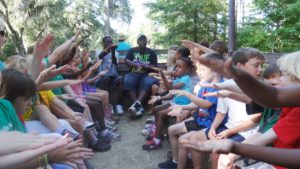
Campers leading songs on a hay ride around the farm.
by Prudence Caskey | Feb 2, 2017
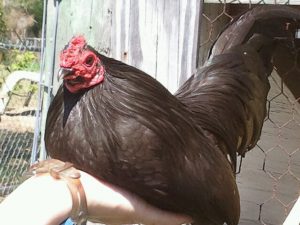 The term “Backyard Chickens” is one many people use today. The idea of having a pet help you make breakfast is growing in popularity. I am often questioned as to which breed of chicken is the best breed. When asked, I always reply, “What do you want the chicken to do?” The reason I ask is because The American Poultry Association recognizes 65 different breeds of chickens. Each breed can meet a different need. Many people will blurt out, “I want eggs!” Well, do you care what color eggs? Do you care how often you get eggs? Does the size of the egg matter? Each breed is different and there are pros and cons to each breed. Some of the more popular breeds that you can find at your local feed store during upcoming “Chick Days” are described below:
The term “Backyard Chickens” is one many people use today. The idea of having a pet help you make breakfast is growing in popularity. I am often questioned as to which breed of chicken is the best breed. When asked, I always reply, “What do you want the chicken to do?” The reason I ask is because The American Poultry Association recognizes 65 different breeds of chickens. Each breed can meet a different need. Many people will blurt out, “I want eggs!” Well, do you care what color eggs? Do you care how often you get eggs? Does the size of the egg matter? Each breed is different and there are pros and cons to each breed. Some of the more popular breeds that you can find at your local feed store during upcoming “Chick Days” are described below:
- Rhode Island Red: This is a breed that is a large-bodied bird that lays a large to extra-large brown egg. These hens are very personable and can have a great personality. This breed can become a pet in no time.
- White Leghorn: This particular bird will lay a large white egg on a very regular basis. The Leghorn is not friendly and is often referred to as “flighty”. Leghorns will not, as a general rule, become pets. They will lay you an egg almost daily, but will run from you when it’s time to collect those eggs.
- (Buff) Orpington: Usually sold in the color buff, additionally available in other colors. This is a large-bodied friendly bird. Orpingtons can become fast friends and will serve as a dual-purpose member of your flock. This means that they are great egg layers, and will also serve as a good meat bird if the desire or need arises.
- Sex-link varieties: With this breed, you will not get a breed, but they have great production. Sometimes called Red Star, or Black Star, the chicks show a difference when day old chicks. It will be easy to determine between the two. If chicks are not your thing, you can always purchase young hens that are just starting to lay.
Many people are not ready to wait five to six months to get their beloved eggs from their new pets. If that is the case, you can always check with your local extension office to inquire if a local 4-H member might have some young hens for sale. On September 30th, 4-H members from across the panhandle will have a “Chick Chain” show and Auction. Save the date and get the best breed for you!
If you have children between the ages of 5-18 (as of September 1st, 2016) and you are interested in starting a backyard flock, you may want to sign up for the 4-H Chick Chain. This program teaches youth how to raise, care for, and show chickens. Registration is open February 1st-24th via 4HOnline. Youth will receive 12, day-old pullets on March 29th. Throughout the spring and summer, youth will learn the ins and outs of poultry farming, and how to market their eggs and hens for profit. They will keep business and health records, learn about bio-security, and gain poise, confidence, and communication skills while showing their hens in the fall. For more information, contact your local UF IFAS County Extension Office, or read about last year’s program.
4-H Poultry Project
4-H Embryology Project
4-H Chick Chain
Poultry Breeds:
Care of Baby Chicks
Factors Affecting Egg Production in Backyard Chicken Flocks
Intestinal Parasites in Backyard Chicken Flocks
Prevention and Control of Fowl Pox in Backyard Chicken Flocks
Small Flock Poultry Nutrition
Vaccination of Small Poultry Flocks
by Jena Gilmore | Nov 10, 2016
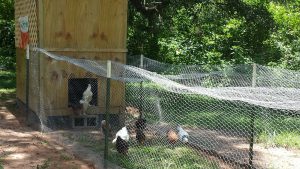
Youth unable to keep chickens at home were able to participate through Cooperative Coops at County Extension Offices. Photo credit: Heather Kent
On Saturday, October 29th, 4-H’ers from across the panhandle suited up in their 4-H Show gear, loaded up their chickens and ventured off to the inaugural Florida 4-H Chick Chain hosted at the Walton County Fairgrounds. This project was piloted last year with Alabama 4-H and is now an annual small animal science project offered here in the panhandle.
The objectives of the project are to help youth learn poultry nutrition and care, to develop communication skills, to develop basic record keeping skills, and to develop responsibility. Over 80 youth participated and have been raising their pullets since May. Over the summer, they participated in webinars and workshops to help prepare them for the show and complete their record books. Some youth participated individually, some youth shared pullets with their siblings (making it a family project). Youth not able to have chickens at their home were able to participate through a Cooperative Coop. Cooperative coops are housed at the Extension Office and youth have the opportunity to sign up for shifts to help “rule the roost” by feeding and watering the chicks, monitoring their health, changing bedding, and cleaning the coop.
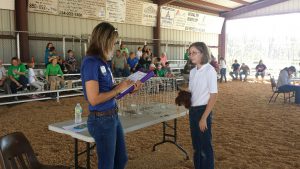
Youth were judged on poise, confidence and how they handled their birds. Photo credit: Heather Kent
On Show and Auction day, youth experienced many opportunities to showcase their “egg-celent” skills they learned through the Florida 4-H Chick Chain project. First, youth were required to check-in their birds at registration with the Agriculture Inspector. This was the final step in determining if the youth had followed all the proper bio-security measures to keep their chickens happy, healthy and disease free. Next, youth participated in a skill-a-thon to demonstrate what they have learned about breed identification, poultry anatomy, and how to set up a brooder properly. During the show, youth demonstrated their knowledge and communication skills with confidence. Youth were judged on how prepared they were to answer questions about their project and how well they handled their birds.
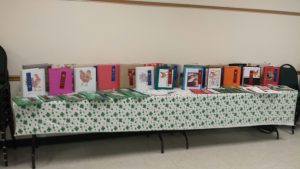
Youth kept records of their project and books were judged and displayed during the show.
Do you have a passion for poultry? If so, consider sharing it with 4-H as a volunteer. 4-H needs volunteers to help teach life skills through projects like this by sparking a lifelong interest in learning, Contact your local UF IFAS County Extension Office or visit http://florida4h.org.
Helpful Resources:
| Junior Showmanship |
1st |
Jena Putnam |
| 2nd |
Sheldon Sparks |
| 3rd |
Jake Rinehart |
| 4th |
Cass Dillard |
| 5th |
Ashlynn Peebles |
| Intermediate Showmanship |
1st |
Katie Ballard |
| 2nd |
Adrienne Murray |
| 3rd |
Lily Smith |
| 4th |
Isaac Hosford |
| 5th |
Kailey Pettis |
| Senior Showmanship |
1st |
Mary Ballard |
| 2nd |
Klarissa Williamson |
| 3rd |
Ashlynn McDevitt |
| 4th |
Myra Miles |
| 5th |
Jayla Kindlespire |
| County Best of Show Grand & Reserve |
HOLMES |
G – Joshua Ernst
R – Emily Ernst |
| JACKSON |
G – Nathan Ziglar
R – Beau Miles |
| JEFFERSON |
G – Jake Rinehart
R – Ashlynn Peebles |
| LIBERTY |
G – Isaac Hosford
R – Millie Revell |
| OKALOOSA |
G – Lily Smith
R – Kaelen Chenard |
| SANTA ROSA |
G – Cayden Smith
R – Cat Proud |
| WAKULLA |
G – Adrienne Murray |
| WALTON |
G – Krista Laviolette
R – Leannah McDevitt |
| WASHINGTON |
G – Cole & Cass Dillard
R – Lillian, Sheldon Sparks & Natalie Taylor |
| Breed Best of Show Grand & Reserve |
BRAHMA |
G – Lily Smith
R – Cole & Cass Dillard |
| DOMINIQUE |
G – Jake Rinehart
R – Krista & Julie Laviolette |
| LEGHORN |
G – Beau Miles
R – Mary Ballard |
| POLISH |
G – Lillian & Sheldon Sparks, Natalie Taylor
R – Nathan Ziglar |
| RHODE ISLAND RED |
G – Emily Ernst
R – Jenna Putnam |
| WYANDOTTE |
G – Jayla Kindlespire
R – Kaelen Chenard |
| Overall Grand & Reserve (New) |
G – Lily Smith
R – Beau Miles |
| Overall Grand & Reserve (Returning) |
G – Emily Ernst
R – Myra Miles |
by Whitney Cherry | Oct 27, 2016
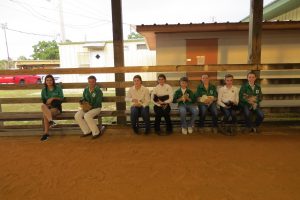
4-Hers are waiting for their moment with the poultry judge. Photo Credit: Misty Smith
I am often asked, “How do you wash a chicken?” I reply, “Just like a turkey, only on a smaller scale!” But for many 4-H’ers, washing chickens is part of showing chickens and is a skill they have to master.
Raising and showing poultry is quickly becoming a hobby for people of all ages. Youth who are active in a 4-H poultry project, are already one step ahead of the rest. Not only do they learn about poultry health, bio-security, and nutrition, they also learn about sportsmanship and other aspects of the poultry industry through showmanship. Many UF/IFAS Extension Offices offer day camps and clinics to help youth learn how to raise and show poultry, so contact your local office for more information- there’s one in every county! Here are a few steps 4-H youth can take to prepare for a poultry show:
Step 1: Handle your chicken daily. By handling your chicken daily, this will ensure that it is used to people, and will be friendly to the judge. A friendly chicken shows the judge that the chicken’s owner has been dedicated to preparing the bird for showing, not just ignoring it and bringing it to the show on show day.
Step 2: Practice holding your chicken. There is a correct way to hold a chicken when you are showing it and you will need to practice, practice, practice. When you and your bird feel comfortable around each other, you can start practicing holding and walking around with the bird the correct way, by placing your middle and fourth finger between the bird’s legs. Using your first finger and pinkie, hold the bird’s wings down. For carrying, put the bird’s head under your arm. When youth practice holding and carrying their bird, the bird becomes very docile and calm which makes for a great show chicken.
Step 3: Know the parts of the chicken. This step is one of the hardest in the entire showmanship procedure.
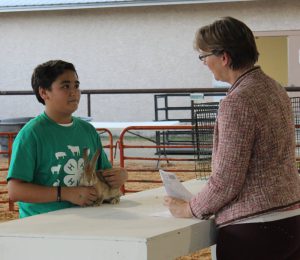
Poultry Showmanship can help youth build communication skills and confidence. Photo Credit: Julie Dillard
It is based on simply remembering the steps and practicing with your bird. Youth are quizzed on the parts of the chicken and whoever knows the most, does the best. Make sure you know about the head, wings, under color, width of body, breast, vent, abdomen, pubic bone, legs and feet, and how to cage a bird. All of these will ensure to the judge that youth have studied about their bird and are very knowledgeable on the parts of a chicken. Also, know about the breed of your chicken. You will want to do your homework on the breed of chicken that you are showing so any questions that the judge may ask about your bird you will know how to answer correctly.
Step 4: Know how to bathe your chicken. The easiest way to bathe a chicken is with a 5 gallon bucket of lukewarm water and dish soap. You want to “dip” the chicken 2-3 times in the soapy water, avoiding getting the head wet, and then dip them in clean water to rinse them off. Never submerge a chickens head in the water due to the fact that the chicken can aspirate and die. If your chicken’s head is soiled, use a wet cloth to wipe it clean. The chicken will take care of the rest by preening itself so make sure that you bathe the chicken 48 hours prior to the show so that there will be time for natural oil replacement. Place your chicken in a wire cage to ensure it stays clean before the show.
Step 5: Have fun! Showing chickens is a great and rewarding experience for youth. Poultry shows are a great opportunity for youth to demonstrate their skills, gain confidence, make lifelong friends and practice responsibility. The 4-H poultry project can be the spark that leads youth to a career in animal science industry where the possibilities are endless!
Do you have a passion for poultry? If so, consider using your knowledge, skills and interests as a 4-H poultry volunteer. We could use your expertise planning shows, teaching workshops and helping youth experience success with their poultry project. Contact your local UF/IFAS Extension Office or visit http://florida4h.org for more info.
Recommended Resources for Poultry Showmanship:











